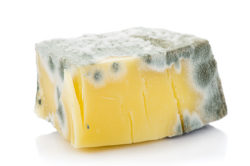When in Doubt, Throw it Out!
There’s nothing worse – especially for the frugal foodie – than throwing out perfectly good food. Or food that WAS perfectly good and is now perfectly spoiled. Food-borne pathogens are responsible for 9.4 million illnesses a year (!) including the Noro-virus, salmonella, e-coli and listeria. And for anyone who’s experienced food poisoning – it ain’t no fun! So we put together the must-have list of when to throw out foods – and we’re not taking any chances!
When to Throw Out Leftovers
 According to the Mayo Clinic, leftovers are safe to eat for three to four days when kept in the refrigerator – longer if you pop it in the freezer right away. If you haven’t eaten the leftover fridge food in four days, your risk of food poisoning increases.
According to the Mayo Clinic, leftovers are safe to eat for three to four days when kept in the refrigerator – longer if you pop it in the freezer right away. If you haven’t eaten the leftover fridge food in four days, your risk of food poisoning increases.
Foodborne illness is caused by harmful germs, such as bacteria in contaminated food. Because those germs don’t change the taste, smell or look of food, you can’t tell whether leftovers are dangerous to eat. So, when in doubt about any food’s safety, throw it out.
Safety with Salads and Sandwiches
 Uncooked foods, such as cold salads or sandwiches should be eaten right away or refrigerated promptly. The goal is to reduce the time a food stays in the “danger zone” — between 40 and 140º Fahrenheit — when bacteria can quickly multiply.
Uncooked foods, such as cold salads or sandwiches should be eaten right away or refrigerated promptly. The goal is to reduce the time a food stays in the “danger zone” — between 40 and 140º Fahrenheit — when bacteria can quickly multiply.
When you’re ready to eat leftovers, reheat them on the stove or in the oven or microwave until the internal temperature reaches 165º.
We probably all have grandparents who would have strenuously objected to throwing out a leftover cooked chicken in less than a week. Maybe longer. Still Tasty, the site where you can find out everything you ever wanted to know about food storage and safety timelines concurs with the three to four day-maximum. 
Home-prepared chicken can start to smell and taste funny after a few days but if you freeze it right after cooking – it should last up to four months. And even if you’re using a store-bought rotisserie chicken with a higher salt content, putting leftover poultry that’s older than four days in your salad or sandwich might be risky business!
Cheese, If You Please?
 If you’ve ever served wine and cheese and awakened the next day to the leftover cheese still sitting out, no doubt you’ve wondered, just how long can cheese stay fresh unrefrigerated? The rule of thumb, according to Bon Appetit and the Wisconsin Center for Dairy Research, is six hours unrefrigerated at a room temp of about 70º is. Hard cheeses left overnight are less risky than a softer Brie or Camembert. But here’s how to tell if your cheese has “gone bad” and needs to be tossed.
If you’ve ever served wine and cheese and awakened the next day to the leftover cheese still sitting out, no doubt you’ve wondered, just how long can cheese stay fresh unrefrigerated? The rule of thumb, according to Bon Appetit and the Wisconsin Center for Dairy Research, is six hours unrefrigerated at a room temp of about 70º is. Hard cheeses left overnight are less risky than a softer Brie or Camembert. But here’s how to tell if your cheese has “gone bad” and needs to be tossed.
The sniff test doesn’t always work with cheese because some fromage is already pretty stinky. Wrap your nose around the baseline smell it has when you buy it — you can use that evaluate when it’s fresh and when it’s not. Mold on cheese is not necessarily a sign of rot. It’s sometimes added to cheeses as part of the ripening process, gorgonzola, Roquefort and stilton being prime examples. 
Mold that grows on the outside can be a sign that it might be unsafe to eat. But in hard cheeses like parmesan and cheddar, just cut away around and below the mold and you can salvage the cheese. Soft cheeses are a different story. It’s wise to throw these out at the first sign of mold, because it can penetrate soft cheeses quickly.
Sugar and Spice and Everything Nice
 Spices make the dish – just imagine apple pie without cinnamon or chili without the chili powder! And while a spice that stay in your drawer or spice cabinet longer than its shelf life is not going to give you a food-borne illness, it can make a huge difference in the flavor of your meal.
Spices make the dish – just imagine apple pie without cinnamon or chili without the chili powder! And while a spice that stay in your drawer or spice cabinet longer than its shelf life is not going to give you a food-borne illness, it can make a huge difference in the flavor of your meal.
The Food Network says that ground spices lose their freshness more quickly than whole spices. The best freshness test is to give them a sniff. If you can’t detect an aroma – throw them out. Whole spices can last for up to five years. And to liven them up, you can toast them in a dry skillet before grinding them up. They should always be kept in a dark drawer or cupboard where daylight cannot penetrate the bottles.
The one exception to the spice shelf life rule is sugar. From all indications, sugar is the perfect spice and lasts indefinitely!
Flavored by the Freezer
 While the freezer helps food last longer when securely wrapped in air-tight packaging, freezer burn is sometimes inevitable. And even though it won’t make you sick, freezer burn dries out your food and the resulting chemical changes alter the look, smell and taste of food. If you ask any of us – freezer burn makes food inedible – even when you cut off the burned bits! It is possible to slow down the burning process by storing meats and vegetables in smaller containers and leaving an open container of water in the freezer to increase humidity.
While the freezer helps food last longer when securely wrapped in air-tight packaging, freezer burn is sometimes inevitable. And even though it won’t make you sick, freezer burn dries out your food and the resulting chemical changes alter the look, smell and taste of food. If you ask any of us – freezer burn makes food inedible – even when you cut off the burned bits! It is possible to slow down the burning process by storing meats and vegetables in smaller containers and leaving an open container of water in the freezer to increase humidity.
Check out Wikipedia for more than you ever wanted or needed to know about frozen molecules, air, homeostasis and freezer burn.
Food-Friendly in Colliers Hill
 If all you saw were the kitchens in the brand new homes of Colliers Hill, you’d have a clue how we feel about food! With pantries and cabinets and plenty of elbow and eating room, the homes crafted by Richmond American Homes, Shea Homes and Meritage Homes have amazing kitchens. Come and explore the amenities and tour the models and move-in ready homes in Colliers Hill. Available in ranch or two-story designs and priced from the upper $300s to the $600s.
If all you saw were the kitchens in the brand new homes of Colliers Hill, you’d have a clue how we feel about food! With pantries and cabinets and plenty of elbow and eating room, the homes crafted by Richmond American Homes, Shea Homes and Meritage Homes have amazing kitchens. Come and explore the amenities and tour the models and move-in ready homes in Colliers Hill. Available in ranch or two-story designs and priced from the upper $300s to the $600s.


